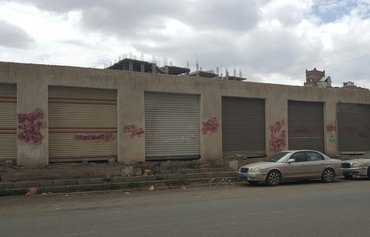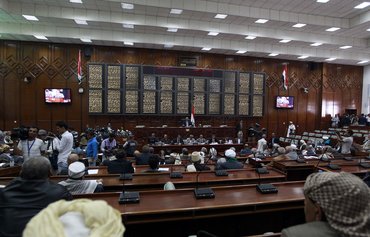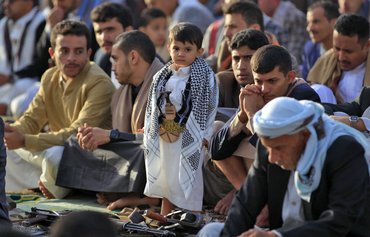Yemen's parliament reconvened on Saturday (April 13th) after a four-year hiatus for an extraordinary session in the Hadramaut province city of Seiyun.
Attending the session, held under tight security, was President Abd Rabbu Mansour Hadi, around 140 Yemeni MPs, and the ambassadors of 19 countries.
The parliament elected Sultan al-Burkani as speaker with a majority of votes to replace Yahya al-Raee. Three deputy speakers also were elected from the political parties represented in parliament.
In his opening address, Hadi said the reconvening of parliament is a significant milestone as it shows Yemenis across the political spectrum have sided with the legitimate government and have decided to uphold national principles.
The meeting was a sign that "Yemenis are recovering one of their most important institutions after a long journey of struggle", he said, noting that this is just a step on the road to a full restoration of rights and institutions.
Hadi urged all lawmakers who did not attend the session "to join their colleagues in this institution to defend their homeland".
His call came amid reports that some lawmakers had received threats from the Iran-backed Houthis (Ansarallah), who sought to keep them from attending.
Restoring state institutions
The importance of reconvening parliament lies in restoring the state's legitimate institutions, Yemeni MP Fouad Waked told Al-Mashareq.
"The parliament is the legislative authority that monitors the government's performance," he said.
"After this extraordinary session, which was held at the president's invitation, the parliament needs to convene in ordinary sessions, so as to resume its sessions that have stopped since the Houthi coup," he said.
In addition to selecting a new speaker, lawmakers attending the two-day session elected heads of parliamentary committees and discussed the state budget.
The reconvening of parliament and passage of the 2019 budget will enable parliament to resume its oversight role and "help the government implement its programme, especially in the economic field", Waked added.
Of the 301 MPs previously elected to Yemen's parliament, 34 are no longer living, Yemeni MP Mohammed al-Salehi told local news agencies, noting that the legal quorum for the convocation of parliament is now 135 MPs.
Government spokesman Rajeh Badi told Al-Mashareq that reconvening parliament "is an important step in the restoration of the state's most important authority -- the legislative authority".
"The successful convocation of parliament in Seiyun will support the government in the implementation of its programmes, especially the state budget, which will be the first thing that the parliament does," he added.
Draft budget under review
On Sunday, parliament approved the referral of the 2019 draft budget to the financial committee, which will discuss it in more detail before submitting its recommendations to parliament.
Prime Minister Mouein Abdulmalik Saeed presented the draft budget to parliament, which sets out the goals the government is trying to achieve in terms of financial, monetary and institutional policies.
In its final form, the budget is expected to include support for social protection, economic recovery, development and reconstruction.
"Through the preparation and presentation of this budget, the government seeks to harmonise the performance of various state agencies and institutions and chart a consistent course," he said.
This will ensure the budget is in line with "the government's key goals and the efforts to restore state institutions and improve their performance", he added.
During the session, lawmakers discussed the budget, and the heads of parliamentary blocs and several lawmakers provided input and initial remarks.
Yemen's government has approved the 2019 budget with estimated expenses of 3.1 trillion Yemeni riyals ($5.6 billion), revenues of 2.1 trillion riyals ($3.9 billion), and an expected deficit of up to 30%.

![Yemenis wave national flags near a banner of President Abd Rabbu Mansour Hadi during a celebration marking the 56th anniversary of the 1962 revolution which established the Yemeni republic, in al-Qahira citadel outside Taez on September 23rd, 2018. [Ahmad al-Basha/AFP]](/cnmi_am/images/2019/04/15/17657-Yemen-national-flag-600_384.jpg)






